NRF: A-rated researchers
Professor Charles van Onselen
University of Pretoria
Charles van Onselen is one of the country’s foremost historians. He was educated at Rhodes University and St Antony’s College, Oxford. He is currently a research professor at the University of Pretoria.
Although grounded in history, his most prolific output is inter- disciplinary, drawing from anthropology, criminology, economics, law and sociology.
He has been acknowledged as possessing ‘an unparalleled sociological imagination, a capacity to link the quotidian lives of ordinary South Africans with broad structural transformations in economic and political life”.
Van Onselen’s most notable work, The Seed is Mine: The Life of Kas Maine, a South African Sharecropper 1894-1985 (Oxford: James Currey), won the Alan Paton Award in 1997. The book is a ‘detailed and compelling history of the effect of South Africa’s land laws on one man and his family”.
In 2002, a panel of international scholars chaired by Professor Njabulo Ndebele voted The Seed is Mine as one of the 100 best books to emerge from Africa in the 20th century.
Van Onselen’s two-volume social and economic history of the late 19th/early 20th century Witwatersrand, New Babylon, New Nineveh (Jonathan Ball) is regarded as a groundbreaking work on the subject.
It has been described as a set of startling, original essays, imaginatively conceptualised, cleverly interlinked by theme and suggestive of new ways of seeing ‘the world the mine-owners made”.
The work continues to receive attention from those scholars developing a post-apartheid perspective on heritage and culture.
Van Onselen also wrote The Small Matter of a Horse — The Life of ‘Nongoloza’ Mathebula, 1867-1948 (Ravan) about a small-time brigand who terrorised black workers on the Rand, but succeeded in creating an aura around his person with his anti-colonial rhetoric.
Of his various scholarly articles and books, it is The Fox and the Flies (Jonathan Cape) that is the most intriguing. It provides a fascinating insight into the history of the Atlantic underworld during the late 1800s and early 1900s.
The book tracks the life of a gangster, Joseph Silver, whom the author stumbled across in a snippet of news in Johannesburg’s Standard & Digger’s News more than 30 years earlier. This report on a court case quoted minutes of a meeting of an ‘American Club” held in 1898 and presided over by Silver.
It spurred Van Onselen to dig into the gangster’s history of criminal activities, which ranged from pimping, extortion and trafficking in white slavery through to robbery.
The Witwatersrand connection presented the initial fascination for the author as he investigated the gangsters whose lives and activities comprised the underworld.
Among Van Onselen’s various awards is the Trevor Reese Memorial Prize in Commonwealth and Imperial History (1984), the PV Tobias Prize awarded by the Institute for the Study of Mankind in Africa (1988) and the African Studies Association of America’s Herskovits Prize (1997). In 2004, Rhodes University conferred on him a doctor of literature, honoris causa
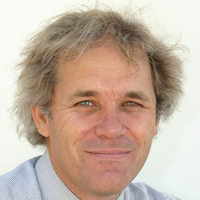
Professor Mark Leonard Solms
University of Cape Town
Mark Solms was educated at Pretoria Boys’ High School and the University of the Witwatersrand. He undertook postdoctoral studies at St Bartholomew’s, the Royal London School of Medicine and the Institute of Psychoanalysis, London.
He returned to South Africa in 2002 as professor in neuropsychology at the University of Cape Town. He is best known for his elucidation of the forebrain mechanisms of dreaming and for his discovery of the double dissociation between rapid-eye-movement sleep and dreaming.
He is also widely acknowledged for his pioneering work in the interdisciplinary field now known as neuropsychoanalysis, which substantially broadened neuroscientific understanding of complex psychiatric phenomena.
Solms has been widely published in leading neuroscientific and psychoanalytic journals as well as in general scientific journals. The best known of his four books is The Brain and the Inner World, which has been translated into 12 languages.
He has received many awards for his scientific and scholarly achievements. These include the George Sarton Medal for contributions to the history and philosophy of science (Rijksuniversiteit Ghent, 1996) and the American Psychiatric Association’s International Psychiatrist Award for 2001. He is translating and editing Sigmund Freud’s complete scientific writings in 28 volumes.
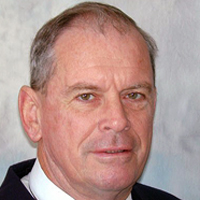
Professor Detlev Kröger
University of Stellenbosch
Detlev Kröger is a researcher in the department of mechanical and mechatronic engineering. He is registered as a professional engineer with the Engineering Council of South Africa and is evaluated as an A1-category researcher by the NRF.
Kröger is a world-renowned leader in the field of research, development and design of cooling towers and air-cooled heat exchangers. Among the numerous awards he has received over the years is the prestigious Bill Venter/Altron Literary Award in 2003 for his acclaimed book Air-Cooled Heat Exchangers and Cooling Towers.
He also received an honorary doctorate from Rand Afrikaans University in 2002. He holds an SM and MechE from the Massachusetts Institute of Technology, where he later also received his ScD, (mechanical engineering). He received his DEng (mechanical engineering) from Stellenbosch University in 2004.
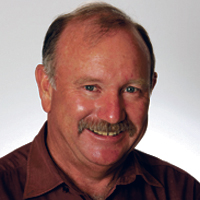
Professor Christopher L Vaughan
University of Cape Town
Christopher (Kit) Vaughan is the deputy dean, research and postgraduate affairs, in the faculty of health sciences at the University of Cape Town (UCT).
In 2004 he was awarded an A-rating by the NRF, and has been similarly rated in 2009. Between 2000 and 2004 Vaughan raised R14-million from the Innovation Fund, R5-million from the Medical Research Council between 2000 and 2008 and R6-million from the NRF’s Technology and Human Resources for Industry Programme between 2005 and 2008.
During the past 30 years he has taught courses in mathematics, physics, biomechanics, grant writing, gait analysis, creative engineering design and biomedical engineering to a wide range of undergraduate and postgraduate students in the faculties of engineering, medicine and science.
He has mentored 11 post-doctoral fellows and written 19 books and book chapters (one of which is a citation classic). He’s also written five computer software packages and 80 articles in international peer-reviewed journals. Since 1999, he’s been the associate editor of Medical Engineering & Physics and the Journal of Biomechanical Engineering.
In 1999 he was elected a life fellow of UCT and in 2005 a fellow of the International Academy for Medical and Biological Engineering as well as fellow of the South African Academy of Engineering.
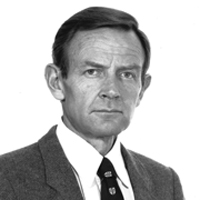
Professor Michael Kew
University of Cape Town
Professor Michael Kew has been an NRF A-rated researcher since 1994. His vast experience and impeccable scholarly credentials have seen him hold prominent positions in various countries.
In the United Kingdom he was the Wellcome Research Fellow, liver research unit, in the department of medicine at Royal Free Hospital in London from 1970 to 1971.
In the United States he served as a Fogarty Visiting Scientist at the National Institutes of Health from 1990 to 1992.
In South Africa, he has held senior positions as the Dora Dart Professor of Medicine in the faculty of health sciences of the University of the Witwatersrand (Wits) between 1978 and 2007, physician-in-charge at the liver unit of then- Johannesburg Academic Hospital, and honorary consultant hepatologist at Chris Hani Baragwanath Hospital.
After retiring from Wits at the end of 2007 he was appointed emeritus professor of medicine and honorary research professor in the department of medicine at Wits and honorary research associate in the department of medicine at UCT.
His main areas of interest are early research on the functional and pathological complications of heat stroke in deep-level gold miners (MD thesis), pathogenesis of the hepato-renal syndrome (PhD thesis), and aetiology and pathogenesis of hepatocellular carcinoma in Southern-African Africans.
Among his various commendations have been the AG Oettle Memorial Medal, the Claude Harris Leon Foundation Award of Merit, the Wellcome Medal for Medical Research, the Gold Medal of the South African Association for the Study of Science, the Distinguished Researcher Award at Wits, the South African Medical Council Gold medal and the John FW Herschel Medal of the Royal Society of South Africa.
He has also won international awards such as the Sir Arthur Sims Travelling Commonwealth Professor 2001 and the Khwarizmi International Award for Fundamental Research. He edited the Liver International Journal between 2002 and 2007.
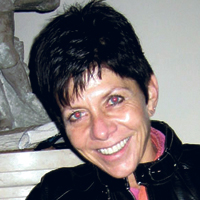
Professor Jill Farrant
University of Cape Town
Jill Farrant did her undergraduate, honours, MSc (all achieved with distinction) and PhD degrees at the University of KwaZulu-Natal, Durban. Her postgraduate studies resulted in 15 papers in international journals.
Her work in plant physiology was acknowledged as pioneering and she won the Southern Africa Association for the Advancement of Science
and South African Biological Society awards for the best MSc.
This was followed by the South African Association of Botanists (Saab) medal for best PhD for this work. Farrant undertook a year of postdoctoral research at the National Seed Storage Laboratory in Colorado with Dr Christina Vertucci- Walters.
While in the United States, she was offered a position as lecturer in the department of botany at the University of Cape Town. In 2001, she moved to the department of molecular and cell biology at UCT, where she became head of department in 2004.
She resigned from that position after being awarded a research chair in molecular physiology. Her MSc and PhD investigated the causes of desiccation sensitivity in recalcitrant seeds (seeds that are short-lived and mostly tropical in distribution).
At UCT, she elected to change research fields and work on mechanisms of desiccation tolerance in vegetative tissues of resurrection plants. These plants are unusual because their vegetative tissues tolerate near total water loss for prolonged periods.
Only a few species worldwide can tolerate such desiccation and 90% of the angiosperm resurrection plants occur only in Southern Africa. Her research on these plants is novel in that it is multidisciplinary (encompassing physiology, biochemistry and molecular biology) and Farrant is the only researcher in the world to work on several different species of resurrection plants and make comparisons between them.
She also works on several tissue types (leaves, roots and seeds) where most people work on only leaves or seeds. Understanding the mechanisms of desiccation tolerance facilitates the identification of characteristics (genes, proteins, metabolites) that might be important for use in bioengineering of crops for improved drought tolerance.
To this end, she was awarded one of the first department of science and technology’s innovation grants for this work, and served as a trustee of the Biotechnology Regional Innovation Centre at its inception.
Farrant’s research has resulted in several other awards, among them the Saab Silver Medal for Excellence in Botany (2008) and recently an NRF A-rating. Considered a leader in her field, she has presented many talks around the world.
She is also the associate editor of Plant Growth Regulation and a reviewer for numerous international journals. She collaborates widely with researchers in South Africa, France, Hungary, Italy, the Netherlands and the US.
Fiercely passionate about academia, in her 14 years at UCT she has had 13 PhD and 25 MSc graduates under her supervision.
At present she is supervising six PhD and eight MSc students. She has been highly active in the mentoring of students, as a student adviser at UCT (1998 to 2003) and in running the equity development programme in the department of molecular and cell biology at the university. She has participated in several documentaries on various aspects of plant biology.
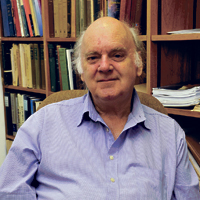
Professor Brian Warner
University of Cape Town
Brian Warner graduated from University College London in Astronomy in 1961 and was awarded his PhD in 1964. He was the Radcliffe-Henry Skynner fellow at Balliol College, Oxford, from 1965 until 1967 and became assistant professor and associate professor in the department of astronomy at the University of Texas in Austin.
In 1972 he was appointed professor and head of the department of astronomy, University of Cape Town. In 2005 he became distinguished professor of natural philosophy at UCT and is now
professor emeritus.
His early research was on the composition of stellar atmospheres, but he later pioneered optical photometry at high-time resolution and its application to compact stars and short-period binary stars.
He has published more than 400 research papers and is the author of two Cambridge University Press books in his speciality area of astrophysics: High Speed Astronomical Photometry and Cataclysmic Variable Stars.
He has also written nine books on the history of science, including Flora Herscheliana (coauthored with John Rourke) and Cape Landscapes (the sketches of Sir John Herschel), and two books of comic verse.
Warner holds a master’s from Oxford, doctor of science degrees from London University and Oxford University and will receive an honorary doctorate from the University of Cape Town later this year.
He was recently made a fellow of his alma mater, University College London. He served on the board of the South African Museum from 1981 to 1999 (chair 1991 to 1999), and of the South African Library from 1990 to 1999.
He is the vice-president of the International Astronomical Union, an honorary fellow of the Royal Astronomical Society, the Royal Society of South Africa and the Royal Astronomical Society of New Zealand.
He has gold medals from the Royal Society of South Africa, the South African Association for the Advancement of Science and the Academy of Science of South Africa.
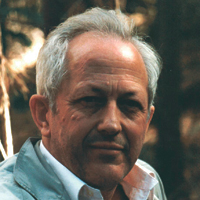
Professor George FR Ellis
University of Cape Town
Professor George Ellis is a professor emeritus of applied mathematics at the University of Cape Town. His professional research work is on relativity theory and cosmology, complexity studies and the brain.
Having held many academic positions beginning at Cambridge, where he served as a research fellow from 1965 to 1967, and assistant lecturer in the department of applied mathematics and theoretical physics until 1970, he was later appointed university lecturer, a position he held until 1974.
Around the same time he was a visiting professor at the universities of Chicago, Hamburg and Boston. In 1973 Ellis co-wrote The Large Scale Structure of Space-Time with Stephen Hawking, debuting at a strategic moment in the development of general relativity theory.
The following year he returned to South Africa and took up a position as professor of applied mathematics at UCT. He served in this role until 1988 and again between 1990 and 2004.
He has held the position of professor emeritus and research associate in mathematics at UCT since 2008. His other career highlights include being a fellow of the Royal Astronomical Society (UK) and of the Institute of Mathematics and its Applications (UK).
He has been a member of the International Astronomical Union and served on the international committee between 1982 and 1995. He served as president of the International Society on General Relativity and Gravitation between 1989 and 1992.
He is a fellow of the Royal Society of South Africa (a former council member and president between 1991 and 1995), founder member of South African Academy of Science and past council member of Inter- Academy Council (Amsterdam).
Between 2000 and 2005, Ellis was a fellow of the Third World Academy of Science and elected fellow of the Royal Society of London in 2007. He has received numerous awards in South Africa and abroad.
In 1984 he was awarded the Herschel Medal of the Royal Society of South Africa, the Claude Harris Leon Foundation Achievement Award in 2003 and the gold medal of the South African Association for the Advancement of Science.
He was also presented with the Star of South Africa Medal by then president Nelson Mandela and the Gold Medal of the South African Mathematical Society for research distinction in 1999.
In 2005 he received the National Science and Technology Forum lifetime contribution award and the Academy of Science of South Africa Gold medal. In 2006 he received the Order of Mapungubwe (silver) from then president Thabo Mbeki.
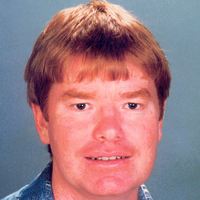
Professor Steven L Chown
Stellenbosch University
Steven Chown obtained his doctoral degree from the University of Pretoria in 1989, based on ecological research undertaken at South Africa’s sub-Antarctic Marion Island.
He took up a lectureship at the University of Pretoria in the same year and was awarded a full professorship there in 1997. In 2001 he moved to a professorship in the department of zoology at Stellenbosch University.
Three years later he led a successful bid for one of South Africa’s centres of excellence and he is the director of the department of science and
technology-NRF centre of excellence for invasion biology.
He also serves as professor in the department of botany and zoology at Stellenbosch University. Through his research on many of the Southern Ocean islands he has contributed considerably to knowledge of the Antarctic, and this work continues to have a considerable influence on conservation policy in the region.
His research in continental South African systems has been similarly influential. Among his theoretical contributions, he has also pioneered large-scale thinking in the physiological sciences, leading the development of the field of macrophysiology, which seeks to comprehend the implications of physiological variations for functioning ecosystems.
He is the author and co-author of three books and more than 250 research papers in the primary scientific literature, is a senior co-editor of a landmark volume on the Prince Edward Islands, and has successfully supervised and co-supervised 25 master’s and 17 doctoral graduates.
On the basis of his work he has received numerous awards including the South African Antarctic Gold Medal (1997), the University of Pretoria’s Commemorative Research Medal (2008) and the Bill Venter/ Altron Literary Award (2009) for his book on insect physiology coauthored with Sue Nicolson.
He has also received academic achiever awards from Stellenbosch and Pretoria universities. He is an elected fellow of the Royal Society of South Africa.
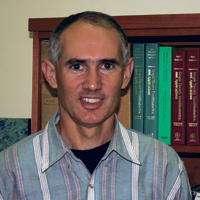
Professor Michael Henning
University of KwaZulu-Natal
Michael Henning is a professor of mathematics at the University of KwaZulu- Natal, based on the Pietermaritzburg campus. His research interests are in the field of graph theory, which is an important area of discrete mathematics and combinatorics.
He has worked on several topics in graph theory such as matchings, extremal graph theory and Ramsey theory. His favourite topic is in the area of domination theory.
To date, he has published more than 240 papers in international mathematics journals and he collaborates with mathematicians from various countries including Canada, Denmark, England, France, Germany and the United States.
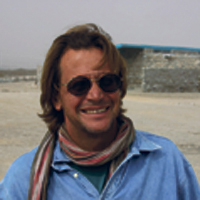
Professor Richard Mark Cowling
Nelson Mandela Metropolitan University
Professor Richard Mark Cowling is a botanist and one of the world’s foremost scholars on threatened ecosystems. His research on ecological and evolutionary patterns and processes has provided novel insights into the remarkable diversity of these systems.
Over the past 10 years he has incorporated this comprehensive knowledge into the development of innovative conservation plans that accommodate explicit targets.
In this context he has conducted pioneering and widely acclaimed research for achieving the goal
of biodiversity persistence in the face of pervasive climate and other human-induced change.
His more recent work has focused on developing conservation plans that facilitate the implementation of conservation action. His research group is at the cutting edge of this transdisciplinary component of conservation science.
By collaborating with social scientists, involving stakeholders and targeting features that deliver ecosystem services, his group has yielded research results that are not only regarded as ground-breaking intellectually, but have also secured several hundred thousand hectares of priority landscape for conservation management.
Cowling is committed to ‘passing the baton” to a younger generation of South Africans, including those disadvantaged by apartheid. He has also contributed to building institutional capacity, having founded the Institute for Plant Conservation (ranked by his peers as one of the leading university-based plant conservation units in the world).
He provides strategic advice to many conservation science units in South Africa and collaborates with local and international scientists.
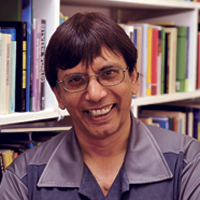
Professor Rajend Mesthrie
University of Cape Town
Rajend Mesthrie is professor of linguistics at the University of Cape Town (UCT). He is the holder of an NRF chair with the main focus on language, migration and social change, and is also president of the Linguistics Society of Southern Africa. For the latter he has served two extended terms over the past nine years.
After a first degree in English, mathematics and education at the University of Durban-Westville, Mesthrie proceeded to study for an honours in mathematics (cum laude, Unisa) while teaching at schools.
He subsequently read for an honours in English at UCT, where he studied under JM Coetzee, among other distinguished teachers. He completed an MA in general and historical linguistics at Austin, Texas (on Coetzee’s recommendation), before returning to South Africa to lecture at Durban-Westville.
He completed a PhD over three years, under the supervision of Roger Lass at UCT, while also lecturing full-time. Mesthrie’s early work focused on the Indian minority in South Africa, producing the first book-length study of an Indian language outside India.
This study, published as Language in Indenture by Routledge and Wits University Press, focused on the plantation history of a group of dialects that merged to form Hindi (or Bhojpuri-Hindi) in the cane fields of Natal.
A follow-up study, on the rise of Indian English in KwaZulu-Natal, was published by Cambridge University Press and remains the only book on a variety of Indian English in the diaspora. He has also produced a dictionary of this dialect.
On the basis of such work he was invited to lead a team of international researchers at Heidelberg on Indian English in the diaspora. He was unable to do so as it meant relocation to Germany for three years. He has instead compromised by running an e-course from his home study, reaching the universities of Heidelberg, Zurich and Cape Town on this theme.
On a broader front Mesthrie has worked on language contact and variation in South Africa, showing how all the languages of the country have influenced each other in sometimes overt and otherwise subtle ways. Such contact varieties that he has brought into the international linguistics literature by a careful and rigorous sociolinguistic dissection include Fanakalo pidgin and Tsotsitaal, two ‘languages” without any mother-tongue speakers.
But he is best known for his study of marginalised varieties of English in the country and the linguistic processes by which communities come up with their own mental and social grammars in the absence of sufficient access to mother-tongue speakers of English.
Such grammars develop their own linguistic logic and Mesthrie’s characterisation of a process he calls ‘antideletion” in lesser-educated varieties of black South African English has attracted significant international interest, especially among researchers in Germany.
Internationally, Mesthrie is recognised as a leading sociologist of language. His book, Introducing Sociolinguistics, published by Edinburgh University Press, is a prescribed work of choice at Stanford, Cambridge, Amsterdam and Cape Town, among others.
His editorial skills have seen him appointed as series editor of Cambridge University Press’s Key Topics in Sociolinguistics and as one of three co-editors of their journal English Today. He was the editor of the 1 030-paged Concise Encyclopedia of Sociolinguistics (Elsevier, 2001).
Mesthrie’s research now focuses on two aspects of language study in South Africa:
(a) the sociolinguistic effects of internal (cross-provincial) migration and external migration from other parts of Africa and
(b) region, ethnicity and class in South African varieties of English.
He is married to historian Uma Mesthrie and spends his spare time savouring good music, football, popular science writing, gardening, cats and rural life.
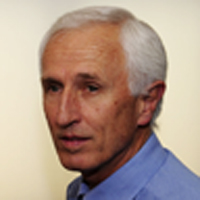
Professor Eric Bateman
University of Cape Town
Eric Bateman is professor of respiratory medicine at the University of Cape Town and head of the division of pulmonology at Groote Schuur Hospital.
He is the founder and director of the UCT Lung Institute. Bateman obtained his MBChB (1970) and doctor of medicine degrees (1984) at UCT and is a fellow of the Royal College of Physicians
(London, since 1986).
He is an elected fellow of UCT (since 2006) and an honorary fellow of the South African Thoracic Society, which he has served as president for three terms.
He is the chairperson of the Global Initiative for Asthma, is a member of the executive committee of the Global Alliance against Respiratory Diseases and serves on committees and task forces of the United States and European thoracic societies.
His research interests include the pharmacology and management of asthma, chronic obstructive airways disease and tuberculosis, and community-based interventions to improve the care of patients with chronic respiratory diseases.
He has contributed to more than 180 publications and serves on the editorial boards of several international journals, including Respirology, Respiration, BioMed Central: Pulmonary Medicine, COPD: Journal of Chronic Obstructive Pulmonary Disease, Advances in Respiratory Medicine and Primary Care Respiratory Journal.
He is a member of many professional societies, including the Asian Pacific Society of Respirology.
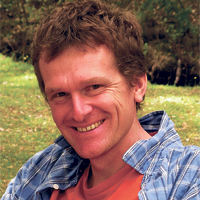
Professor Steven Johnson
University of KwaZulu- Natal
Professor Steven Johnson has been an NRF-rated scientist since 1999, having previously received the P- and B-ratings, before his current A-rating. He studied at the University of Cape Town where he was awarded his PhD in 1994 for his thesis titled: Pollination and the evolution of floral traits in the Cape flora.
He then did his postdoctoral studies in 1995 at the University of Haifa, Israel, and University of Uppsala, Sweden. He served as a Smuts fellow at UCT between 1995 and 1997. In 1997 he was appointed senior lecturer at the University of Natal, Pietermaritzburg.
In 2004 he was appointed associate professor before taking up a full professorial role in 2007.
Among his many awards are the South African Association of Botanists’ book prize for ‘best third-year botany student” in 1998, Best Young Scientist Award at the annual congress of the South African Association of Botanists in 1994 and South African Association of Botanists Junior Medal for best PhD thesis in 1996.
In 2001 he received the UCT Merit Book Award (for Table Mountain: a Natural History), which also won the University of Natal Book Prize (general) the following year.
In 2002 he was awarded the University of Natal Vice-Chancellors Research Award and in 2003 the Botanical Society of South Africa Percy Sergeant Medal. In 2007 he was awarded an NRF-department of science and technology South African research chair.
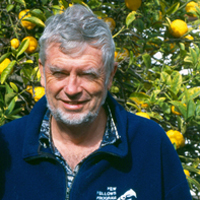
Professor George Branch
University of Cape Town
A Zimbabwean native, Professor George Branch has been an NRF A-rated researcher since 1990. He studied at UCT, then joined the teaching staff in various capacities, beginning as a junior lecturer in the zoology department straight after his honours year.
He served as a lecturer between 1967 and 1974 and became senior lecturer in 1975. He was appointed associate professor in 1979 and professor in 1985, followed by various stints as head of the department of zoology and subsequently chairman of the School of Life Sciences in 1991.
He has received various awards for his work, including the Purcell Prize for best postgraduate biological thesis in 1965, fellowship of UCT in 1983, Distinguished Teachers Award in 1984, the UCT Book Award for The Living Shores of Southern Africa in 1986 and again in 1995 for Two Oceans — a Field Guide to Marine Life.
Branch was awarded the fellowship of the Royal Society of South Africa in 1990, received the Gold Medal of the Zoological Society of Southern Africa in 1992, and was honoured with the Gilchrist Gold Medal for contributions to marine science in 1994.
In 2006 he received the International Temperate Reef Award for Lifetime Contributions to Marine Science. His passion for the sea and its creatures made him the obvious scientist to advise the producers of the acclaimed SABC environmental series, Shoreline, which is currently being broadcast on South African television.
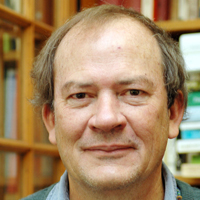
Professor William J Bond
University of Cape Town
Professor William J Bond is professor of botany at the University of Cape Town and has held this position since 1992. Before that, he was a senior lecturer and associate professor between 1988 and 1991.
He did his undergraduate degree in botany and zoology at Exeter University in the United Kingdom before enrolling for his masters at UCT in 1981. At that time he worked as a scientist at the forestry department, Saasveld Forestry Research.
In 1982 he enrolled for his PhD at the University of California, Los Angeles (UCLA). Upon his return in 1987 he spent a year back at Saasveld.
Bond has been elected a fellow of the Royal Society of South Africa; a fellow of UCT; Erskine fellow, University of Canterbury, New Zealand; and was awarded a silver medal by the South African Association of Botanists.
He served as a board member of Cape Nature Conservation between 1999 and 2006, and as a member of the editorial board for Oecologia between 1994 and 2001.
He has been an advisory member of the editorial board of Global Ecology and Biogeography since 2000 and a member of the editorial board for Koedoe (the journal of the South African National Parks Board — Sanparks) since 2007.
In 2007, he was invited to join the editorial board for Global Change Biology. He has participated in various initiatives, including the Country Studies Analysis on Climate Change
Impacts on South Africa (published in December 1999) and the first climate-change conference in South Africa. The latter was jointly organised with the Royal Society, UK, in
October 2005.
He has also contributed to the International Panel on Climate Change (IPCC) chapter on biodiversity effects, which was a major coup for South Africa. He served on the organising committee of the First Seed Ecology Conference in Rodos, Greece, in May 2004 and organised (with J Midgley), the Southern Connections Conference at UCT in January 2004.
He has been a participant in the Quantifying and Understanding the Earth System (Quest) programme, led by Professor Colin Prentice, which is a large programme studying terrestrial ecosystem feedback to climate change.
He has been part of the Pics programme (a French- South African research partnership) since 2004. Since 2005, he has been a Sanparks expert in meetings on monitoring and management initiatives, especially relating to fire and elephant population management.
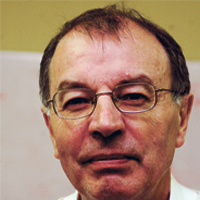
Professor Jean Cleymans
University of Cape Town
Belgian-born Professor Jean Cleymans has been an NRF Arated scientist since 1985. He joined the physics department at the UCT in 1986, where he was head of department between 2002 and 2004.
He received his doctorate of science from the University of Louvain, Belgium, in 1970 and his habilitation at the University of Bielefeld, Germany, seven years later.
He has won the Alexander von Humboldt Research Prize and Fellowship in 1999 and the prize of the Polish ministry of national education twice for research excellence in 2000 and for outstanding team research in 2003.
He has held numerous fellowships, such as Nato fellow at the Stanford Linear Accelerator Centre, California, in 1970; fellow of the Royal Society of South Africa, in 1993; Cern (European Organisation for Nuclear Research) fellow, Geneva, Switzerland, and fellow of UCT (elected on research excellence), both in 1994.
He was recently invited as an independent expert to review proposals submitted to the European Union FP7 infrastructures programme. He has edited two books and supervised 10 PhD and 17 MSc students.
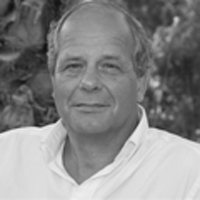
Professor Johannes van Oort
University of Pretoria
Professor Johannes van Oort is an honorary professor of patristics in the faculty of theology at the University of Pretoria.
He undertook a combination of several studies between 1970 and 1986, starting with undergraduate studies in social sciences until he was awarded his PhD in 1986 from the University of Utrecht. These studies were in the course of various part-time and full-time teaching and pastoral jobs.
During this period he was awarded with the University of Utrecht prize for the best student in theology in 1976; received an MA (doctorandus) in theology with the highest possible distinction in 1979; and idem (DD) in theology with the highest possible distinction in 1986 for his PhD.
This led to him being elected in 1987 as the first senior research fellow of the Royal Netherlands Academy of Arts and Sciences as well as being awarded a visiting professorship in Oxford, Warwick and London by the British Academy.
He received research grants and subventions from scientific bodies (such as the British Academy, the Union Académique International and Unesco). He was also awarded honorary fellowships of the University of Stellenbosh, the University of Leuven and the British Academy.
He serves in several international historical, patristic and theological societies and has been the president of the International Association of Manichaean Studies since 2001, which served earlier as its secretary.
He has published about 20 books and numerous scientific articles, mainly on the history of the early church (particularly Augustine), on the history of the Reformation, and on gnosticism and Manichaeism.
Van Oort is the managing editor and book-review editor of Vigiliae Christiana: A Review of Early Christian Life and Language (published by EJ Brill, Leiden-Boston).
He has had an editorial role in several works, including the book series Supplements to Vigiliae Christianae (EJ Brill, Leiden-Boston).
He is also the managing editor of the Corpus Fontium Manichaeorum, of the Studien der patristischen Arbeitsgemeinschaft/Patristic Studies (Peeters, Leuven-Dudley MA), as well as the book series Nag Hammadi and Manichaean Studies (EJ Brill, Leiden-Boston).